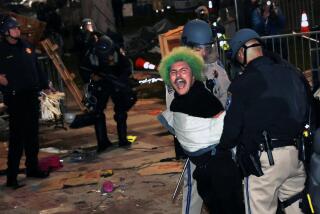From the archives:: The ambush killings of 4 CHP officers that changed California policing in 1970
The massacre that left five Dallas police officers dead comes 46 years after a notorious ambush in Santa Clarita that left four California Highway Patrol officers dead.
The CHP killings, known as the Newhall Incident, changed police training and brought a number of memorials over the years. Here’s a report from 2008 from Times Staff Writer Bob Pool:
For the record:
1:54 p.m. Aug. 18, 2019An earlier version of this article stated that Bobby Augusta Davis was serving four life sentences at Pelican Bay State Prison. Davis committed suicide in prison in 2009.
It was the 4 1/2 minutes that forever changed the California Highway Patrol.
In 1970, four CHP officers died in a fierce gunfight with a pair of heavily armed motorists outside a Valencia coffee shop after a seemingly routine traffic stop.
In 2008, a five-mile stretch of Interstate 5 in Santa Clarita that runs past the shooting scene was renamed in honor of the dead officers as surviving family members and witnesses recalled what generations of CHP officers know as the “Newhall Incident.”
Grandchildren of the slain patrol officers helped unveil one of the large signs that will proclaim the freeway as the “CHP Officers James E. Pence, Jr., Roger D. Gore, Walter C. Frago, George M. Alleyn Memorial Highway.”
During the unveiling ceremony a few miles from the site of the shootout on April 5, 1970, state and local leaders proclaimed the four slain officers heroes. And pointing into the crowd of about 300, they singled out Palmdale resident Gary Kness and bestowed the same label on him.
Kness was a passerby who ran toward the gun battle as shots were still being fired. He tried to drag the mortally wounded Alleyn out of the line of fire. When one of the two assailants began firing at him, he grabbed Alleyn’s service revolver and shot back, wounding the attacker.
Now 69, Kness was hugged by Alleyn’s relatives. A long line of CHP officers and other law enforcement authorities formed to shake his hand. “I’ve always heard of you. I’ve wanted to meet you all my life,” said retired San Fernando Police Officer Fred Iversen.
Kness shrugged off the hero designation.
“I was driving to work as a computer operator when I turned the corner on the Old Road and saw the gunfire,” he told Iversen. “I saw two CHP cars and a red car. I always say my brain said to get out of the way, but my feet ran the wrong way.”
As he struggled to pull the 24-year-old Alleyn to safety by his service belt, Kness grabbed a CHP shotgun lying on the ground and aimed it at one of the gunmen. The shotgun was empty, however.
Kness snatched Alleyn’s service revolver from the ground, aimed with both hands and fired, hitting gunman Bobby Augusta Davis in the chest. When Davis kept advancing toward him, Kness tried to shoot again, but the CHP pistol was out of bullets.
“I was upset there weren’t four or five more rounds in there,” Kness said. “After that, I ran and jumped in a ditch. The dumbest thing is, I still had the service revolver in my hand. I was afraid when more police came they’d think I was one of the gunman. So I put it behind me and said, ‘They went that way.’ ”
One of the arriving backup officers, retired CHP Sgt. Harry Ingold of Canyon Country, recalled that one of the gunmen shot at him as he pulled his cruiser into the parking lot of J’s Coffee Shop.
J’s was full of customers, including members of a church choir who had stopped in for a late-night snack, when the gunfire broke out at 11:55 p.m. By midnight, Ingold could see a cloud of gun smoke hanging over the four officers lying on the ground. The two gunmen were fleeing.
“Everybody was pointing toward where the gunmen had gone. I was in a state of shock,” recalled Ingold, now 64. “Later, I circled all four bodies with chalk and wrote their names on the pavement so we’d know where they’d fallen when they were taken away.”
In the end, gunman Jack W. Twinning, 35, of Winston-Salem, N.C., killed himself as Los Angeles sheriff’s deputies closed in on him. The wounded Davis, 29, of Houston surrendered without incident. He was sentenced to four life terms and committed suicide in prison in 2009.
Patrol officials said the rampage permanently changed the agency from a corps of highway helpers to hard-core cops. It also prompted police departments across the country to adopt tough procedures for cautiously pulling over cars and carefully taking suspects into custody.
There was much debate in the coming months and years about what went wrong and how training could be improved to prevent future loss of life.
The CHP discussed these changes on a web page devoted to the shooting.
“In the weeks immediately after the four deaths, the emotionally charged follow-up investigation sometimes lingered on fault-finding, but ultimately achieved the desired catharsis - a completely revamped set of procedures to be followed during high-risk and felony stops, with emphasis at every step on officer safety,” the agency wrote. “If there can be such a thing as a silver lining in a cloud this dark, it would be the renewed focus on officer safety.”
More to Read
Sign up for Essential California
The most important California stories and recommendations in your inbox every morning.
You may occasionally receive promotional content from the Los Angeles Times.










